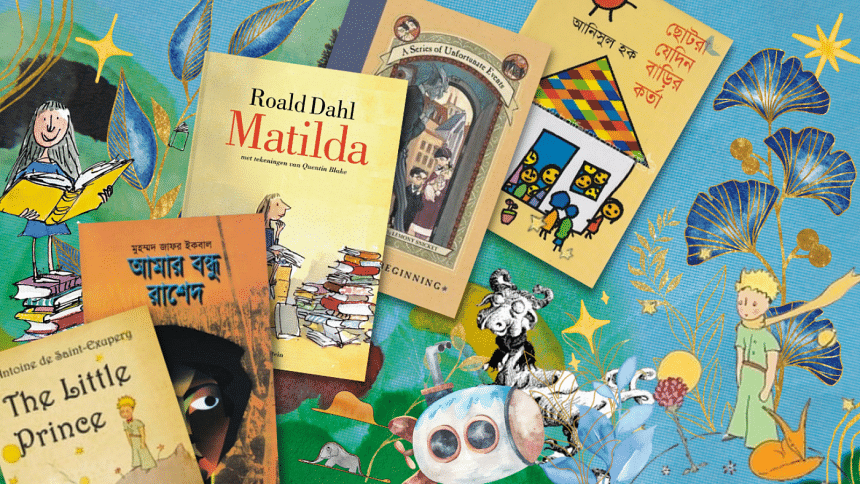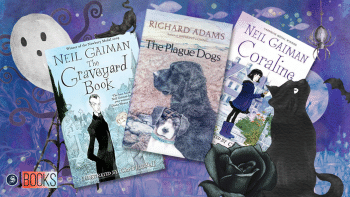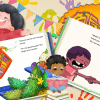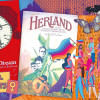The wisdom of innocence

The doorbell rings. It's 8pm. The children feel the jitters of joy fizz up their limbs, carrying them over to the doorframe, where dad enters: sometimes with DVDs of the latest Pixar movie collection in hand, sometimes with Chacha Choudhury comics. On the weekend, once done with bathing and lunch, the children are, quite ritualistically, allowed to sit by the PC and watch a movie, something like Harry Potter and The Sorcerer's Stone. At school on Sunday, the bhabis talk about what they allow their children to watch over the weekends—how educational they are. When they're back home, the mother tells the aunt on the phone: "ki shob ajgobi jinish dekhay, jharu te uthe ure beray."
There's a strange dichotomy in the way we perceive and treat children and the media made for them. On the one hand, children's media is expected to be didactic, imparting moral lessons that will make them wiser, more prepared for the adult world that awaits their growing steps; on the other, they are considered too juvenile and devoid of intellectual value for adult consumption. I have seen this dichotomy play out throughout my journey as an avid enjoyer of cartoons and children's literature from as far back as memory serves till now (as I'm nearing 30) in the scrunched up noses of the rest of my family decrying any animated show or movie as "ei ki baccha der jinish dekhteso", all the way to my friends saying they let their children watch the children's cartoon series Omar & Hana because of the moral values it instils in them.
It is commonplace in Bangali households (perhaps even worldwide) to tell children to grow up and not to act grown up whenever the grown ups deem fit—something I myself am guilty of doing as an educator. The irony is not lost on me: rather, it intensifies with age, as I am yet to find a trace of the profound understanding of the world that I was taught adults would possess. However, in hindsight, that very wisdom feels all the more apparent in the stories written for children: the likes of Roald Dahl's Matilda (1988), Lemony Snicket's A Series of Unfortunate Events (first published 1999), Zafar Iqbal's Amar Bondhu Rashed (2011), Anisul Haque's Chotora Jedin Barir Korta (2012), etc. Moreover, these stories, whether in books or movies, not only provide pearls of wisdom for young minds, but even subvert the preconceived notion that wisdom is cultivated with age as they portray adults whose foolishness is exposed by the simple worldview of the child protagonist's narrative perspective.
The first time I was introduced to this concept was during my undergrad Literature course, with William Blake's Songs of Innocence and of Experience (1789). Blake's juxtaposition of childish innocence and tainted experience highlights how the more positive traits of an innocent worldview, like optimism and creative imagination, get deformed by the harshness of experience into suspicion—thereby, shedding light upon the greed, prejudice, jealousy and corruption rampant in the adult world. In "The Chimney-Sweeper" from Songs of Innocence, we have a child as the poetic speaker telling us of life and duty in this job, where he rationalises the act of shaving a chimney sweeper's hairs to console his aggrieved peer—"Hush, Tom! never mind it, for, when your head's bare, /You know that the soot cannot spoil your white hair." He continues as a soothsayer to his peer's grievances from the hardships and fatalities of being a chimney sweeper, as a voice of comfort that helps them make peace with their condition by the promise of God's justice. On the flipside of this coin, in the accompanying poem "The Chimney Sweeper" from Songs of Experience, the poetic speaker is an adult happening upon a hapless child—a chimney sweeper—who educates this adult on the injustices that adults impose upon children just because they laugh and play away their woes ("And because I am happy and dance and sing, /They think they have done me no injury, /And are gone to praise God and his priest and king, /Who make up a heaven of our misery"). Such similar antithetical themes are apparent and recurrent throughout the paired poems such as "The Lamb" (Innocence) and "The Tyger" (Experience) where the lamb's innocence is equated with godliness while the beauty of the vicious tiger is associated with the evils of the adult world. Although Blake's poems in the collection are not technically classified as children's literature, what I do find noteworthy as I survey them now is how both the 'Innocence' and 'Experience' sections critique the negativity of the adult world with the child's point of view.
One of my most astute 9th graders at Scholastica, Adnan, notes: "Experience does not always mean deeper insight; sometimes it just leads to a biassed perspective [based on individual trauma]." He and several classmates recall studying Lois Lowry's Number The Stars (1989) in the 5th grade—where the narrative perspective of a ten year old Annemarie Johansen contemplates the absurdity of wars and questions the validity of dividing people by religion or race in the advent of the Nazi occupation in Denmark. I personally find it to be a profound example for the purpose of this article, as the writer, quite apparently an adult, uses the curious, inquisitive perspective of a child as a vehicle for underscoring how the same values and ethos that adults institutionalise through academic and religious education to instil in children are the same ones they blow up into smithereens with their weapons of mass destruction. But Annemarie's is only a fictitious contemplation. We find very similar meditations in Anne Frank's diary entries in The Diary of A Young Girl (1947) as she muses on her lived reality in the time of the Second World War. Perhaps, this lends topicality to this exploration of age and wisdom: as the war rages within the heart of Palestinian grounds and the vile cruelty inflicted upon Palestinian children is circulated through shared posts on Facebook, several grown ups, reprehensibly, wish the same vileness upon Jewish children.
Quite unfortunately, an adult's narrow perspective oftentimes ends up affecting the children around them, as popularly detailed in Matilda and quite poignantly depicted in Robi Thakur's Daak Ghar (1912). In the play, Amal's innocent perspective of the natural world helps the doiwala, prohori and every other adult who passes by his window gain a more positive perspective of their own work and lives, leaving them grateful to have gained a slice of wisdom from this little boy. Yet, the contrasts of Amal's innocence against his adoptive uncle, Madhob's rigid understanding of the human world, ends up stifling Amal's imagination rather than fostering it within the bounds of his home-prison. Even until the very end, with Amal's passing, Madhob is unable to recognise how Amal's spirituality gives him a much more enlightened worldview than anyone older than him.
In cases of children's exploration of right or wrong, I find a tendency of adults to label them as "beyadob". Regarding this, a former student, Benji, notes how Alice's rebellion against the rules of Wonderland [serves as an allegory for] how odd and eccentric the adults' world is from a child's perspective in Lewis Carroll's children's classic. We also observed this expository phenomenon of children's rebellion when I taught him The Reservoir (1968) by Janet Frame. Despite the adults' (quite justified) fear of the unknown in Frame's narrative, it is the children's rebellion and intrigue for the unknown that allow them to garner both experience and knowledge in exploring the reservoir, a new contraption practically unheard of prior in a 60s rural New Zealand—with the adults being none the wiser.
Hence, when Antoine de Saint-Exupéry's Little Prince from the eponymous Little Prince (1943) quips on his encounter with the adults on the various planets, saying that he has had nothing of worth to learn from them, I can see why. And not just me—so can William Blake, Lois Lowry, and the authors mentioned prior. I believe all authors, auteurs and artists who have observed the aforementioned idiosyncrasies of adulthood that makes it so short-sighted as opposed to the imaginative open-mindedness of children can attest to the claims I have made here. As adults, we have a lot to learn from children, to regain the insights we have lost to the various experiences of growing up. And this is particularly exemplified to me by something my now 25-year-old brother had said in his toddlerhood when he was asked by an adult to keep a secret—"ami shob bujhi kintu kichui boli na".
Tashfia Ahmed is a writer and poet who teaches English at Scholastica School.

 For all latest news, follow The Daily Star's Google News channel.
For all latest news, follow The Daily Star's Google News channel. 








Comments